
A U.K. team has analyzed whole-genome sequencing (WGS) data on 10,478 patients spanning 35 cancer types recruited to the U.K.’s 100,000 Genomes Project. They identified 330 candidate driver genes, including 74 that are new to any cancer. This study, they write, is one of the most comprehensive efforts to date to “…identify cancer driver genes in the real world setting and assess their impact on informing precision oncology.”
Their research was published in Nature Genetics, June 19. The first author is Ben Kinnersley, PhD, the University College London Cancer Institute.
The growth in the number of drug targetable genes has highlighted the limitations of single-analyte genomic assays in cancer. The now modest incremental cost of adding additional cancer genes to high-throughput sequencing-based panels has, in turn, made the development of drugs targeting increasingly smaller subsets of molecularly defined patients with cancer financially and logistically feasible. The U.K’.s 100,000 Genomes Project (100kGP), aims to deliver precision oncology through WGS to National Health Service (NHS) patients as part of their routine care.
A huge growth in the number of cancer gene databases has occurred, which means diagnostic laboratories have had to keep up. “We use about 17 databases,” says Rick Baehner, MD, chief medical officer, precision oncology, at Exact Sciences. By using so many databases, he says, they can provide, “the highest level of evidence,” when they diagnose any tumor and try to match it to a treatment.”
This U.K. team estimated that approximately 55% of patients studied harbor at least one clinically relevant mutation, predicting either sensitivity or resistance to certain treatments or clinical trial eligibility. By performing computational chemogenomic analysis of cancer mutations the team identified additional targets for compounds that represent attractive candidates for future clinical trials.
Eighty-five genes were identified as a driver in more than two tumor types, with 26 drivers found in more than five tumor types. TP53 was the most commonly identified tumor types, followed by PIK3CA, ARID1A, and PTEN, which were found to be cancer driver genes in 29, 18, 16, and 14 different tumor types, respectively.
Across the 35 different tumor types, in 9,070 unique samples, the team found 12,606 distinct oncogenic mutations in tumor-relevant cancer driver genes. The median number of oncogenic mutations in cancer driver genes per sample was two and the highest median number of oncogenic mutations in driver genes was found in uterine cancer samples.
The uptick in targeted cancer drugs against even rare genomic mutations has spawned novel clinical trial designs, including basket trials, in which patients are recruited based on mutational status instead of organ site, cancer stage, and histology. Many oncologists now consider that tumor genomic profiling should be offered to all patients with cancer who are not candidates for curative-intent local or systemic therapy.
The U.K. researchers also looked at new therapeutic intervention strategies. Of the 330 candidate cancer driver genes identified in this study, they say 261 (79%) are not currently identified as therapeutic targets in either COSMIC or OncoKB databases. As a means of triaging these genes as.
To sort out the good candidates for therapeutic intervention, they used RNAi/CRISPR DepMap data and the integrative cancer-focused knowledgebase, canSAR, respectively. They found 96 of 261 (37%) of these genes are predicted to be commonly essential and of these 12 of 96 (13%) have a chemical probe available and 35 of 96 (36%) have a ligandable three-dimensional (3D) structure.













